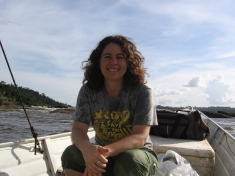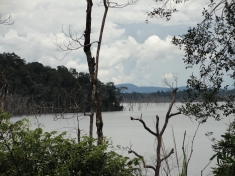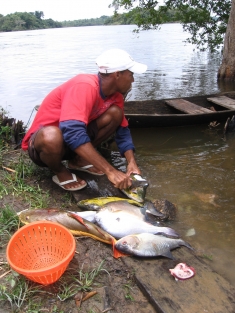Reflections on 16 Years of Dam-busting
This week I will be leaving International Rivers after 16 years with the organization. I’m moving back to my native Australia and taking on the position of Pacific Coordinator for a new international anti-coal network. While I’m excited for the fresh challenges that lie ahead, it’s a bittersweet time for me.
International Rivers has been central to my world for much of my adult life. While it’s not hard for me to imagine International Rivers without me, in some ways it’s hard to imagine me without International Rivers. In so many ways I have grown up at International Rivers: as a woman, a mother, an activist, and a leader. When I came to International Rivers in 1997, International Rivers Network was a small, scrappy outfit of a little more than a dozen people perched on top of a parking lot in Berkeley, California. I was hired as the first full-time coordinator of our Mekong work.
At the time, the battle over the massive Nam Theun 2 Dam in Laos was heating up for the first time, and together with IRN’s Patrick McCully – the person who taught me more about dam-fighting than anyone else – we were engaged in an epic battle with the World Bank over financing for the project. While we defeated Nam Theun 2 several times over an eight-year period, ultimately the World Bank gave the green light and the project was built. After a decade’s effort to stop Nam Theun 2, my colleagues joked that I deserved a PhD in Nam Theun 2. In 2011 when I went back to see the completed project, I wept at the sight of the massive reservoir with its dead trees poking out where there was once a meandering free-flowing river. It’s an image that I will never forget.
After 16 years of dam-fighting, here are some of the lessons I’ve learned and things I will carry with me for the rest of my life:
- The biggest success stories come from a strong local movement fighting for their rights. Local communities have enormous power to effect change if they are united, persistent and have the necessary tools and resources. That’s what I will always love about the work of International Rivers: we provide so many tools to so many people around the world. There are times when we hear of dam victories that we weren’t even aware of, and later learn that the communities attribute part of their success to a guide they received from International Rivers, a video they saw, or an activist they met. That’s the power of a real movement
- Big dams rarely die, but often change names. I can name many projects that we’ve defeated countless times over the years that unfortunately seem to always come back, in a new form, sometimes with a new name, and almost always with a gentler, greenwashed image. The most egregious of these is the Belo Monte Dam in the Amazon, which was kept at bay for over 20 years and is now under construction.
- Victory is not only measured by stopping a dam. Each campaign must be seen as part of the larger goal of protecting rivers and ensuring that local voices are included in the decision-making process. By providing consistent and strong opposition to nasty dam projects, many projects have been unable to get off the ground, and many others have not been proposed because the opposition would be too great. As Peter Riggs, a beloved former funder of International Rivers, once told me: “It is a peculiar reality of our jobs that sometimes we are forced to measure progress by ‘what didn't happen.’ A lot of terrible things didn't happen because International Rivers was there to talk sense and wake people up. A lot of people have not been displaced from their homes. A lot of people continue to be able to grow vegetables on riverbanks in the expectation that those crops can be harvested. A lot of people can get their drinking water with a gourd and a pulley, rather than paying for it from a vendor. A lot of people in the Mekong Basin are able to continue to live in the ways in which their ancestors wanted them to, and to raise their children in ways that are consistent with their community values, because you guys – unseen, unknown – were on the job.”
I’ve shed many tears these past few weeks and will surely shed many more in the coming weeks as I say my goodbyes and transition from the world of water to the world of coal. While it's time for me to move on, I will miss so much about International Rivers – our incredible staff, our amazing partners, our dedicated board of directors, and, perhaps most of all, the rivers. Waking up in a hammock by the side of the free-flowing Xingu River to see the sun rising over the riverbanks; traveling down the Xe Bang Fai River in Laos in a small fishing boat and waving to the children swimming along its banks; hearing the mighty roar of the Pascua River in Chilean Patagonia as it makes its treacherous descent out of Lago O’Higgins; and drinking a Beer Lao on the banks of the mighty Mekong in Laos as the sun sets over Thailand. And then there’s the fish: freshly grilled, boiled, stewed or turned into fermented fish paste, I can attest to the truly delicious variety of freshwater fish that the rivers of this world provide.
International Rivers will continue to be the go-to group for protecting the world’s rivers for many years to come, and I look forward to staying involved and watching the organization grow and thrive. But in the meantime, I’ve got a coal plant or two I need to stop…





